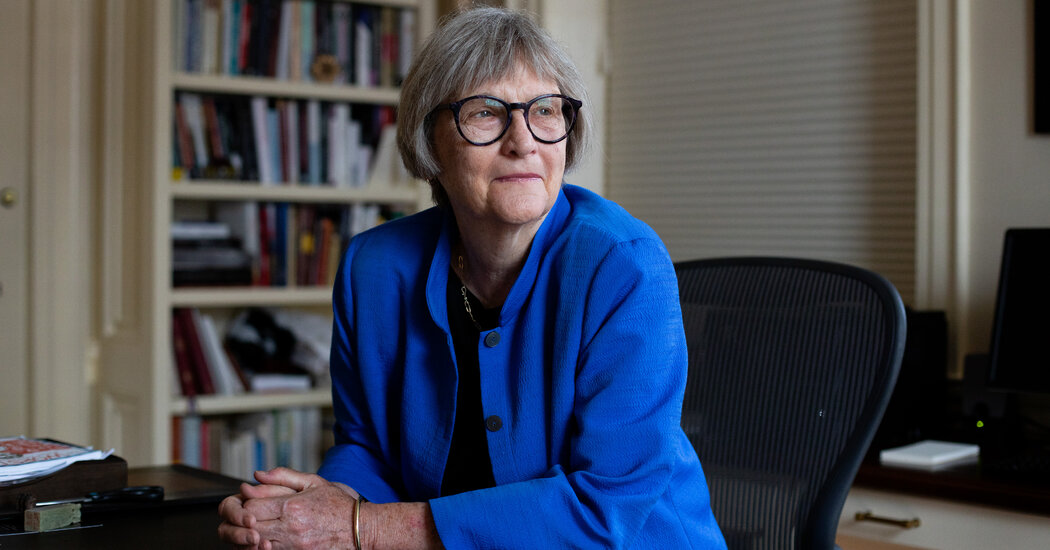
In “Necessary Trouble,” Drew Gilpin Faust, Harvard’s former leader, wrestles with her conservative Southern upbringing, and the unfinished business of the Civil War.
As president of Harvard University from 2007 to 2018, Drew Gilpin Faust was the first woman to occupy the highest bully pulpit of American higher education. But before that, she was a leading historian of the Civil War and the Old South, who combed through letters and diaries of people like her own ancestors, trying to understand, as she puts it, how people could believe — and defend — “abhorrent things.”
It’s a questioning that started early. In 1957, after the shocking — to her — discovery that Black children were not allowed in her Virginia public school, young Drew wrote to President Eisenhower.
“Dear Mr. President,” she began, “I’m nine years old and I am white, but I have many feelings about segregation.”
It was un-Christian, she explained, and just plain unfair. “Please Mr. Eisenhower,” the letter closed, “please try and have schools and other things accept colored people.”
Faust found the letter in the archives of the Eisenhower library, while researching her new memoir, “Necessary Trouble: Growing Up at Midcentury.” In the book, which will be published on Aug. 22 by Farrar Straus and Giroux, Faust turns the tools of the historian’s trade on herself, and the privileged, conservative Southern world she grew up in — and moved away from.
“It could be described as an escape from Virginia, both literally and metaphorically, and an escape from a past and a set of circumstances that were stifling,” she said last month in her office at Harvard.
But it’s also an argument for the possibility of social and political change, against what she sees as the fatalism — and forgetting — of today.
“The times I grew up in were in many ways unimaginable to younger people today, especially in the face of proclamations that nothing has changed, everything is terrible, everything’s always going to be terrible,” Faust said. “If a younger person was parachuted into the 1950s, they would be horrified beyond belief.”
Self-exposure, let alone gutbucket confessionalism, doesn’t come easily to Faust, whose manner is measured and reserved. She wanted the book, she said, to be a “history memoir,” grounding her own story in the sweep of larger events.
As Faust tells it, it’s a story of personal awakening and social progress. In 1964, at age 16, she joined an integrated student group traveling through the Deep South on a racial reconciliation mission. She marched at Selma in 1965, protested the Vietnam War and challenged white-glove social strictures at the all-female Bryn Mawr.
But for all its implicit optimism, “Necessary Trouble” lands at a fraught time for some of the causes Faust has championed. Among the mementos in her office — a 19th-century women’s suffrage poster, a bat signed by the 2018 Red Sox — she pointed out one in particular: a courtroom sketch showing her 2018 testimony in defense of Harvard’s use of race-conscious admissions.
The case went to the Supreme Court, which ruled in June that the practice violated the Constitution. The decision, while expected, landed “like a kick in the gut.”
“Affirmative action really affirms that history matters, that the past is still playing a role in the present,” she said. “I believe that fervently. It’s what my book is about, and what my life as a historian has been about.”
“Necessary Trouble” starts with her privileged childhood on the family farm in the Shenandoah Valley, where young “Drewdie” was more interested in books and animals than the accouterments of Southern ladyhood. She writes fondly of her father, a thoroughbred breeder, and frankly of relationships with the family’s Black employees, which was governed by a racial hierarchy as rigid as it was unspoken. (One employee, the pioneering horse trainer Sylvia Rideoutt Bishop, was “the only Black woman in my childhood I did not call by a first name.”)
She constantly butted heads with her mother, whose wealthy New Jersey childhood had left her with little education or purpose (and a deep discomfort, Faust writes, with living around Black people).
Her mother, who may have suffered from adult anorexia, died when Faust was 19. “You killed her,” a family friend said after the funeral.
Faust recalls smiling politely and thinking, “At least I didn’t kill me.”
Henry Louis Gates Jr., the director of the Hutchins Center for African and African American Research at Harvard, said he was impressed by the subtlety and frankness of the family portrait.
“What struck me so powerfully,” he said, “was the way that the usual separation between mother and daughter manifested itself in their divergence in their attitudes about race.”
Gates grew up in the same period, about 80 miles away in a West Virginia mill town, evoked in his 1994 memoir “Colored People.” “But her world,” he said, “was a world apart.”
To reconstruct it, Faust dug into archival records, family letters, demographic data, even the tax code (to explain the declining family fortunes).
In family papers, she discovered that her paternal grandfather, a Virginia state delegate, had opposed the 19th Amendment, which gave women equal right to the vote. She pairs that with another detail harvested from the archives: In her first presidential election, in 1968, she was one of only two people in her county to vote for the comedian Dick Gregory, whose absurdist protest campaign included a promise to paint the White House black.
As a child, Faust identified with plucky “girls who dare,” like Nancy Drew and Scout from “To Kill a Mockingbird.” Coming into adulthood, she was more like the older Scout of “Go Set a Watchman,” who wrestles with the realization that her beloved father, Atticus, is an ardent segregationist.
As a college student, Faust was deeply influenced by Albert Camus and his injunction against becoming an “executioner,” complicit in the evils of one’s society.
Faust said she wanted to figure out a life “where I could do my best to strive to deal with the oppressions of which my society had been so much a part.”
The book ends in 1968, with her graduation from Bryn Mawr. After a stint at the Department of Housing and Urban Development, she started working on a Ph.D. in American Civilization at the University of Pennsylvania.
At Penn, she had no women professors. But by the time she graduated in 1975, the Nixon administration, which had extended affirmative action across the executive branch, was putting pressure on universities.
Her department was told it could have an extra position if they hired a woman. “So they hired me,” she said.
She put it bluntly: “I am an affirmative action product.”
As a scholar, Faust gravitated toward her home region, at a moment when the study of slavery and the Civil War was being transformed. In a 2011 appreciation, the Yale scholar David W. Blight called Faust “a historian’s historian,” who has mapped fresh terrain far outside “the comfort zones of Southern history.”
In “Mothers of Invention” (1996), she explored how the Civil War altered the social roles of Southern women, whose declining morale, she argued (to much continuing debate), contributed to the collapse of the Confederacy. “This Republic of Suffering,” from 2011, examined how the conflict’s unprecedented scale of death transformed all aspects of American society, North and South.
Her scholarship, Faust said, is motivated by the same questions she asked as a child. “How did my parents believe in segregation? How did the people who lived in Virginia 100 years before believe in slavery? How did they come to defend slavery?” she said.
And also, for us today: “What is it that we’re able to convince ourselves of that blinds us to justice?”
That’s not just an academic question at the nation’s oldest — and richest — university, especially in an era of boiling resentment of elite institutions on both the left and the right.
Last month, the Biden administration opened a civil rights investigation into Harvard’s use of legacy preferences. There have also been growing calls for Harvard and similar institutions to increase their class size or share their wealth.
As president, Faust (who led a record-breaking $9.6 billion capital campaign) sometimes rankled activists and the old guard alike. In 2016, she angered some alumni with attempts to curb Harvard’s traditionally all-male “final clubs,” which are independent of the university but hold considerable sway over social life.
“It’s my one great regret I didn’t make more progress,” she said, describing the lines of women that form outside the clubs for parties.
“Women are not supplicants for men’s favor,” she said, “or should not be.”
Faust also challenged Harvard’s selective amnesia about its own history. In 2017, at a conference on universities and slavery, she acknowledged that Harvard had been “directly complicit in America’s system of racial bondage.”
The year before, Faust had installed a modest plaque by the door of the small clapboard building that houses her current office. It honors Titus, Venus, Bilhah and Juba, four enslaved people who worked there in the 18th century, in the household of Harvard presidents.
In her memoir, Faust describes another marker, installed by her grandmother near the family cemetery plot, remembering “the many personal servants” — “faithful and devoted” — buried there “before 1865.”
Asked about the relationship between the Harvard plaque and her grandmother’s euphemistic tribute, Faust paused. Both, she said, were responses to “the burden of the past,” at a moment of change.
When she stepped down in 2018, Harvard was at “the beginning of recognizing our own complicity, which we had turned away from and not paid attention to,” she said. “But there was so much more to be done.”



